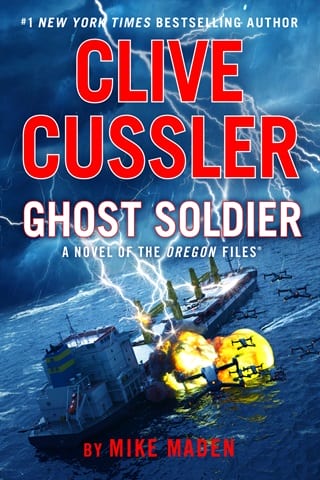Chapter 48
48
Thump!
The last salvo of drones launched from the towed trailer. Rahul Tripathi stood in a clearing, his eyes fixed on a display screen. The first wave of vehicles would soon be in place.
His robot Mak?ī — Hindi for "spider"—was also fully charged and armed. Its flamethrower had been rotated out and replaced with a long-range sniper rifle equipped with a new kind of scope and guided bullet.
Rahul was as unnerved by the air-raid siren as the mercenaries had been, perhaps even more so. He was grateful when it finally cut off. The otherworldly din not only terrified him but interfered with his thinking process already hampered by his nervous excitement.
The young Indian national was completely confident in the surveillance and weapons systems the Vendor had helped him design and build. The previous demonstration had shown its effectiveness against inferior test subjects, but failed to impress the Vendor's clients.
Today's demonstration was altogether different. This was actual combat—and he could be killed. But he needed to prove the Mak?ī 's worth, and his own.
His greatest fear was disappointing the Vendor. As far as he knew, he was the youngest member of the Vendor's network. It had been an honor to partner with such an advanced mind. He even thought of the Vendor as a mentor, living the kind of life Rahul only dreamed of until now.
The Indian engineer was brilliant, but he was also no fool. Despite his technological advantages, the fact remained he was battling thirteen highly trained and combat-experienced former special operators. He possessed neither of those qualities. This was not by accident.
The Vendor was selling the concept of a "plug-and-play" combat system. A system that anyone with minimal video gaming skills could deploy effectively. He told Rahul the analogy of the English longbow. As effective as it was on battlefields like Agincourt, it nevertheless required years of training and strength to master. The crossbow replaced it en masse because it required neither and shot with even greater force.
Rahul was not only up against the mercs' incredible killing skill sets, he also had the challenge of finding them. True to his word, the Vendor didn't give Rahul access to the mapping device. He had no idea where the flags were located, so it was impossible at this moment to set up ambushes for the soldiers at those locations. In short, he was hunting prey while largely deaf and blind.
So what did he know? First, there were only ten flags. Second, all ten flags had to be secured. Third, the soldiers could only make their way to those flags on foot. But that wasn't much to go on.
He next applied his logical faculties, beginning with the question What would I do if I were in charge of the merc team?
His pulse quickened at the obvious answer. Kill the Indian drone operator!
Fortunately, Plata and the others had the same problem he did—lack of information. Also, the size of the island meant they could have no assurance of finding him within the forty-eight-hour period.
So what was the next logical move? To secure the flags as quickly as possible—especially because the mercs had the advantage of knowing where they were located.
Given that likely scenario, Rahul's strategy had been to embrace the probabilities. He was already familiar with the island and had access to a topographical map that included the underground mines beneath the city along with their entry points.
He had also been informed by the Vendor the flags were relatively evenly distributed between the city, the surrounding jungle, and the mines.
A quick survey of the topographical map showed him where the soldiers were most likely to travel—and were to avoid—in their journeys across the island.
With these parameters in mind and the topo map uploaded, Rahul unleashed the Mak?ī 's AI-generated surveillance and targeting package. That package was a modified version of the "Gospel" AI-targeting program, stolen from the Israelis by the Vendor's network.
The Mak?ī had divided up the island into ten zones of approximately equal size both above and below the surface. It excluded those portions of the island least likely to contain a flag, such as stretches of beach, large ponds, and the like. The city and the mines received additional resources since they were more confined spaces and thus harder to surveil.
Rahul's drones were then automatically programmed with their respective surveillance and combat algorithms and launched. And thanks to other tech on board his drones, he would soon gain access to the mercs' comms net, as well as acquire visuals on them when they inevitably came out from under cover. And the ones that didn't? They would trigger one of the sensors his drones were distributing even now.
Rahul checked the time. The battle would soon be joined. The thought of besting these battle-hardened mercs pleased the young gamer, but taking their twenty million dollars as his own prize money excited him even more. Poverty was more terrifying than death.
A vast array of colored lights activated on his handheld device. Each type of drone was indicated by a certain color. Aerial drones would soon finish depositing their loads of ground sensors and then take up their positions for electro-optical surveillance. This would give him nearly total informational awareness of the battle space.
Once his targets were identified and tracked, he would unleash the kinetics. His launch trailer would remain in place and keep launching drones as the automated network program dictated.
Rahul pulled on his helmet with its heads-up display (HUD) shield. Instantly the interface that was on his handheld device appeared on his HUD shield and the Mak?ī whirred to life, no longer hitched to the launch trailer.
The slim engineer headed up the mountain trail, his mechanical monster dutifully marching behind him.
It was time for war.
 Fullepub
Fullepub 



